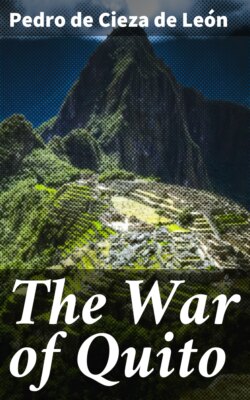Читать книгу The War of Quito - Pedro de Cieza de León - Страница 5
На сайте Литреса книга снята с продажи.
CHAPTER I
ОглавлениеTable of Contents
How the Viceroy Blasco Nuñez Vela sailed from San Lucar, and what happened until his arrival at the city of Panama, which is in the kingdom of Tierra Firme.
THE Viceroy Blasco Nuñez had been ordered to fit out ships to sail from Spain, and to continue his journey to the kingdoms of Peru. When everything was ready, he sailed from that port, with the knights who were to accompany him, on Saturday the 3rd day of the month of November in the year of our redemption 1543[2]. Navigating swiftly over the great ocean sea, he sailed on until he arrived at Gran Canaria. Here he took in fresh provisions and was joined by the Licentiate Cepeda, who was going out as a Judge. Leaving that island, the voyage was continued until the ships arrived at Nombre de Dios three days after Epiphany in 1544. Here he remained for 15 or 16 days, at the end of which time he proceeded to the city of Panama with those who had accompanied him.
I deeply lament that a knight so accomplished as was the Viceroy should have fallen into the hands of such wicked and perverse men. For his want of judgment and lack of prudence in public affairs did not merit a death so cruel as he met with at Añaquito near the equator. The things that must happen cannot be prevented, and all is in the will of the most high God.
The Viceroy arrived at the city of Panama without waiting for the Judges who, for some reason, did not leave Nombre de Dios with him, but remained there. The Viceroy found the Licentiate Pedro Ramirez de Quiñones, now Judge of the Confines, in Panama. He was taking the residencia of Dr Villalobos and the Licentiate Paez, who had been Judges of the Court established in that kingdom. Presently the Viceroy took the royal seal, and placed it in a box with the veneration which was its due, with several chapters of the Ordinances[3], intending to carry out the orders literally. They required that all the men and women of Peru should be sent to their native homes at the cost of those who possessed them, it being the will of the King that they should be free, as his subjects and vassals[5]. Notwithstanding that the order was just and righteous, some of the Indians evaded it because they were married, others because they liked their masters and were tolerably instructed in the matters of our Holy Catholic Faith. Even of those who were ordered to depart many merely went to hide in secret places so as not to go whither they were sent, and others went to the churches, whence they were taken by order of the Viceroy, and put on board ships, where many died. So that very few returned to their native places, and those that did went back to the rites and idolatries they had formerly been accustomed to. There was thus no benefit derived from compliance with this ordinance. Some Spanish conquerors, who returned to Spain, had lived with Indian women for many years, and had children by them. These were to be sent to the native places of the mothers at the cost of their masters. If they disputed or complained they had to pay double for freight and passage. Some had small children and prayed that they might not be sent to die owing to having no mothers. These were ordered to pay a still larger sum.
The authorities, appointed to enforce the new laws in Peru, were the Viceroy and four Judges of the Royal Court of Justice[6].
When the Judges arrived at Panama there were some entertainments, and it was reported that the Viceroy and the Judges were not on very good terms, and that, in secret, neither he treated them well, nor they him. Considering the severity of the new laws, and the difficulty of enforcing them in Peru, owing to the resistance of those in that kingdom, the Judges suggested to the Viceroy that an intention to enforce them should not be shown until they were in possession of Peru. When the Court was established there, it would be easier to enforce the orders of his Majesty. The Viceroy had received news of what was passing in Peru, of the great number of people in that kingdom, of the proceedings of the Governor Vaca de Castro, and that there were many charges for artillery and arquebuses and much gunpowder in the cities of Lima and Cuzco. He was strongly advised to enter Peru quietly and with consideration, for if he came in another way there would be a rebellion against him. For besides the arms and people actually in the country, more came every day, and are now coming. But the Viceroy, unmoved by these reports, replied that his single cloak and sword would suffice for all Peru. Many, hearing these boastings, foresaw what they must be prepared for. As the ordinances were so severe against men who had lived so freely as those in Peru, and so heavy for them, it was evident that they would take up arms, for it was their custom to contend in war for very slight causes.
